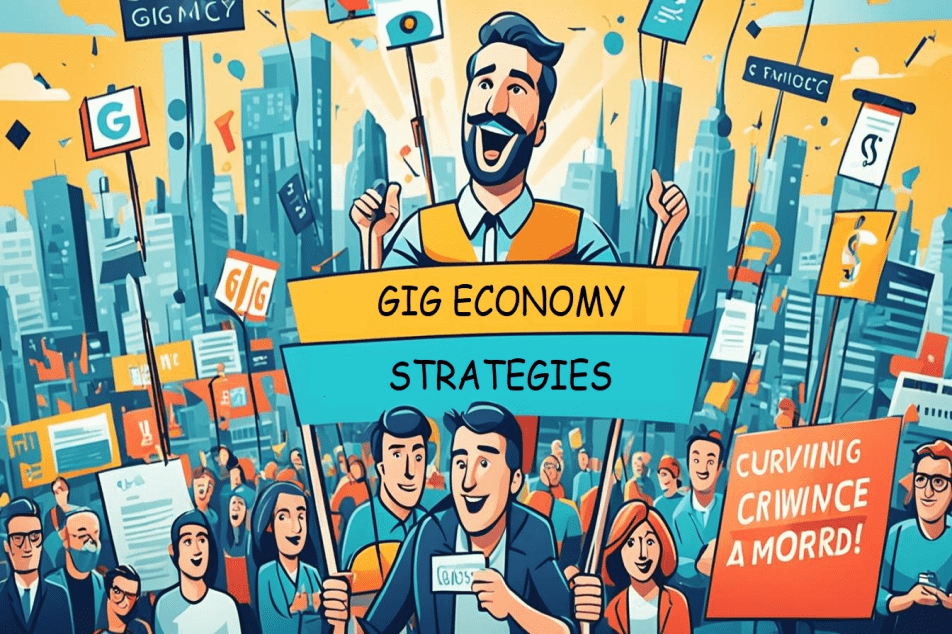
In today's job market, the gig economy is a major player. It changes how companies create gig economy strategies and draws in many freelancers. Technology drives the gig economy. It values freedom and flexibility over traditional job stability. The gig economy consists of short-term jobs, project work, and freelance tasks. This is quite different from the old ways of working for years at the same company.
Nowadays, professionals want jobs that fit their own schedules and lifestyles. Gig workers enjoy choosing when and where they work. They aim for success through planning and being their own boss. Companies are competing by offering more than just pay. They also provide work that helps gig workers grow and feel valued.
Working gigs does come with challenges like job insecurity and lacking usual job benefits. But by looking for opportunities actively, making connections, and learning new skills, gig workers can thrive. Companies must also support these workers by creating good working conditions. This is essential for keeping the best freelance talent.
The Rise of the Gig Economy and Its Impact on Workforce Dynamics

The gig economy is changing jobs through short-term gigs, temp work, and freelancing. Digital platforms, tech progress, and a desire for work freedom are driving this change. People want autonomy and flexibility now more than stable, long-term jobs.
Today, people crave work that offers control over their careers and a balance between life and job. The gig economy meets these desires. It's not just about freelance work. It's a big move towards career independence and lifestyle flexibility.
Understanding the Gig Economy: A Flexible and Decentralized Model
The gig economy connects talented folks with short-term projects needing specific skills. Places like Upwork and Fiverr are key to this world. They help gig workers find work and help companies manage costs and stay nimble.
Shift in Work Preferences: Autonomy and Work-Life Balance
What's attractive about the gig economy? It lets people choose their work style. Millennials and Gen Z love this flexibility. They value freedom, balance, and choosing their projects more than old-school job setups.
Working gigs can mean less job security. But it also means more variety and protection against economic ups and downs. The gig economy is growing. It's changing our view of work and creating a flexible, skill-based job market for the future.
Effective Strategies for Attracting Freelance Talent

In today's fast-paced gig economy, attracting freelance talent is key for businesses everywhere. With more freelancers wanting flexibility in work and better opportunities, companies must adapt to stay attractive. Here are important strategies to keep in mind:
Embracing Flexibility to Enhance Satisfaction and Productivity
Freelancers really value flexibility in work. Offer flexible schedules, remote work options, and the freedom to choose how work is done. This can greatly increase job satisfaction and productivity. It makes your company very appealing to top freelance talent.
By meeting freelancers' personal and professional needs, businesses promote a better work-life balance. This also boosts the quality and commitment to projects.
Offering Competitive Compensation Packages
It's crucial to offer competitive pay for freelancers to attract them. Freelancers like jobs that give them freedom and good pay. Make sure your pay is competitive with the market to attract skilled freelancers.
Be clear about pay rates and make payments quickly. This builds trust and may encourage freelancers to stay long-term.
- Survey current market rates regularly to keep your compensation packages attractive.
- Offer additional perks such as bonuses for project completion, referrals, or exceptional performance.
- Invest in professional development opportunities that not only enhance the freelancer's skill set but also contribute to your project objectives.
By mixing respectful practices with flexible work and competitive pay for freelancers, businesses can effectively attract a strong freelance workforce. These strategies fit today's gig economy and prepare for future trends.
Creating a Supportive Environment for Gig Workers

The modern workspace is changing a lot because of the gig economy. Making a supportive work environment is really important now. It helps create a positive work culture that keeps gig workers happy and wanting to stay.
Importance of a Positive Work Culture for Freelancers
Having a positive work culture helps freelancers work better and feel connected to the company. When companies show respect and support, gig workers feel just as important as full-time staff. This kind of respect makes freelancers give their best in every project.
Building a Community for Gig Economy Professionals
Community building is critical to make gig workers feel part of the team. It helps blend the traditional and gig workforce and creates a feeling of unity. By building a community, gig workers can share ideas, work together, and advance in their careers.
- Motivational Events: Hosting online gatherings keeps freelancers in touch.
- Project Inclusion: Making sure freelancers are fully part of the team.
- Feedback Channels: Having open lines for communication encourages better work and teamwork.
By focusing on bringing gig workers into the fold and supporting them, businesses can make a great workplace. This not only makes people work better together but also strengthens the team for future challenges.
Professional Development as a Tool for Retention

In today's fast-paced gig economy, the growth of freelancers is key. Offering upskilling opportunities and training is essential. It's not just nice to have; it's a must for keeping talent. This way, companies boost project success and build loyalty in their freelance teams. Supporting freelancers' growth ensures they're happy and stick around.
Investing in Training and Up-Skilling Opportunities
- Offering targeted training geared towards the development of specific skills that are in high demand in the gig economy.
- Providing access to certifications and courses from renowned institutions to help freelancers stay ahead of industry trends and methodologies.
- Integrating robust e-learning platforms that offer flexible, on-demand learning opportunities tailored to a freelancer's schedule.
Networking and Growth: Long-Tumb Benefits for Freelancers
- Building a freelancer network that fosters connections, facilitates professional relationships, and opens up new opportunities for collaborative projects.
- Organizing workshops, webinars, and meet-ups that provide freelancers with the environment to connect, share ideas, and enhance their social and professional bonds.
- Encouraging peer mentorship programs within the network to help new entrants and seasoned professionals alike gain insights and support from their contemporaries.
In conclusion, a culture of learning and community among freelancers offers big wins for businesses in the gig economy. By pushing professional development and upskilling opportunities, companies attract and keep the best freelance talent. This approach leads to success in today's competitive marketplace.

In today's gig economy, learning to navigate is key for startups and entrepreneurs. As jobs shift from traditional to gig-based, understanding flexible work strategies helps companies stay competitive. This adaptability is crucial in today's fast-paced world.
Getting involved in the gig economy opens doors to a world of talent. Platforms like Upwork and Fiversion let businesses find skilled freelancers. These freelancers bring expertise, innovation, and new ideas, which are essential for success.
- Startups can cut costs by hiring freelancers, using their skills when necessary without the expense of full-time salaries.
- Flexible staffing models let businesses adjust their team size based on need, useful in unpredictable markets.
- Managing freelancers well means clear communication and making them feel valued, just like full-timers.
For startups to succeed in the gig economy, they must support freelancing. Fair pay, respecting personal time, and offering chances for growth are key. Sites like Alison promote ongoing learning, important in the gig economy.
Looking after freelancers' health and well-being is also crucial. More companies are creating wellness programs for gig workers. These efforts build community among remote workers and tackle their unique challenges.
As the gig economy grows, companies that adapt, integrate flexible strategies, and support freelancers will thrive. This new work environment demands such flexibility and understanding.
Streamlining Workflow with Efficient Onboarding Processes

In today's fast-paced gig economy, efficient onboarding and optimized workflow are key. Businesses that master these are ahead of the game. They make sure freelancers are ready to start fast, boosting productivity and happiness for everyone involved.
The Impact of Clear Communication and Expectations
Starting any project with clear talks and set goals is essential. It helps avoid confusion and aligns everyone's work from the beginning. Including detailed plans, how to talk, and schedules is all part of this method. It creates a trusty work environment.
Adopting Technology for Enhanced Collaboration and Productivity
Using tech is crucial in today's gig work for better teamwork. Projects management tools and chat apps make working together smooth. This tech use shows a real commitment to being the best in productivity and teamwork.
- Project management software like Asana and Trello can integrate freelancers smoothly into ongoing projects.
- Real-time messaging applications such as Slack and Microsoft Teams ensure that communication is immediate and effective.
- Cloud storage services like Google Drive and Dropbox allow for easy sharing and management of project materials.
Using these tech solutions helps make workflows better by keeping updates and feedback flowing. It makes freelance work more effective and keeps you competitive. This not only makes things run smoother but also helps grow freelance networks in all fields.
Leveraging Digital Platforms for Gig Economy Matchmaking

The gig economy is growing fast, thanks to digital platforms. These platforms make finding freelance work easier. They also help businesses and freelancers support each other. By using these platforms, companies can find the perfect talent for their projects from around the world.
Connecting Businesses with Skilled Freelancers
Gig economy platforms do more than list jobs. They match businesses with freelancers who have the right skills. This makes sure projects get done well and on time. These platforms use smart algorithms to match businesses and freelancers, considering their skills, past work, and reviews.
Examples of Successful Platform Use Cases
- BGSF is a standout platform for matching companies with talent in sectors like tech and the arts. Its specialized focus ensures the right people are working on the right projects.
- Platforms like Upwork and Fiverr let businesses tailor their searches to fit their budgets and needs. They also make talking and managing contracts easy, proving their worth as freelancing tools.
The gig economy platforms streamline hiring and boost workforce flexibility. As companies keep turning to these digital tools, the future of freelancing looks bright and full of possibilities.
Fostering Long-Term Partnerships between Businesses and Freelancers

The gig economy is growing fast, offering great chances for businesses and freelancers. Businesses can use specific skills, while freelancers get to be their own boss. But, creating long-lasting partnerships is key. This means making sure freelancers have steady work and working together well.
The Importance of Consistency in Gig Work
Having steady work is crucial for trust and dependability between freelancers and businesses. For freelancers, it means a reliable income and really being part of business goals. This helps them care more about long-term success. For businesses, working regularly with trusted freelancers means projects meet business expectations. Steady work allows for better project execution and a team that fits the company's culture.
Strategies for Developing Collaboration and Trust
To build lasting freelance partnerships, businesses need strong collaboration methods.
Here are ways to help:
- Make sure communication is clear, so everyone knows the project goals and what is expected.
- Use project management tools to keep track of progress and give feedback. This makes working together easier.
- Pay freelancers fairly and offer rewards. This builds loyalty and motivation.
- Check in regularly and talk openly about any issues or successes. This encourages better work and a stronger partnership.
By focusing on steady gig work and good collaboration, businesses and freelancers can grow together. They can build partnerships that last and are successful for both.

The gig economy is growing fast, offering both good and bad sides. It promises flexibility and freedom in work. Yet, it also brings doubts about steady income and lost job perks.
Understanding the Importance of Benefits and Security
Many gig workers miss out on benefits like health insurance or paid holidays. Sadly, 74% worry about money issues. Gig jobs, with their ups and downs, put freelancers in tough spots financially. This highlights a big need for better safety nets.
Options for Gig Workers: Insurance and Associations
- Private Insurance Options: Gig workers can get essential coverages like health or disability through private insurance plans. These plans are designed for those who are self-employed or in the gig economy.
- Professional Associations: Joining groups helps gig workers stand stronger together. They can push for better pay and benefits. Plus, they help find steady work through job platforms.
- Portable Benefits: A new idea, portable benefits, links perks to workers instead of jobs. 56% of gig workers like this idea. It could solve the issue of losing benefits when switching gigs.
Knowing these options can help freelancers a lot. It means better financial safety and benefits. This makes gig work more stable and appealing.
Leveraging Personal Branding and Diversifying Income in the Gig Economy

In the gig economy, your personal brand and how you manage your income are key. These aren't just strategies; they're vital for success and survival. The choice of when and where to work boosts job satisfaction and work-life balance.
Yet, this flexibility has its downsides, like uncertain income. This shows how crucial a unique personal brand and multiple incomes are.
Building a Strong Online Presence
For freelancers, having a strong online presence is crucial. It means more chances to get noticed. Your personal brand should showcase your value and best work.
Use platforms like LinkedIn to keep a professional look online. Many young people spend lots of time on social media. A strong digital presence can attract clients and attention from leaders in your field.
Exploring Multiple Revenue Streams to Mitigate Risks
Income diversity means more financial security. It's smart to look for gigs with steady pay. But also engage in networking and joining webinars or forums. These activities can lead to new opportunities for making money.
Millennials and Gen Z are active in the gig economy. They show how having varied skills can lead to success. Thinking ahead about finances, like saving for retirement and health insurance, helps protect your career.
In the gig economy, do you think "job title" will become an obsolete concept? Should we all just introduce ourselves as "freelance task-doers" instead?









